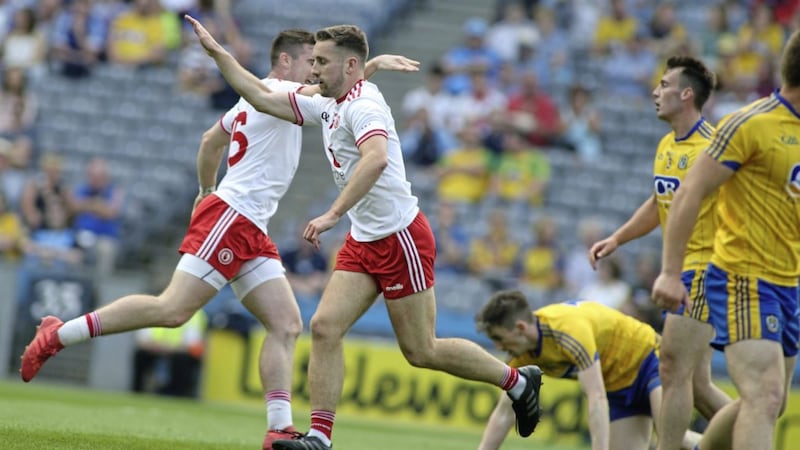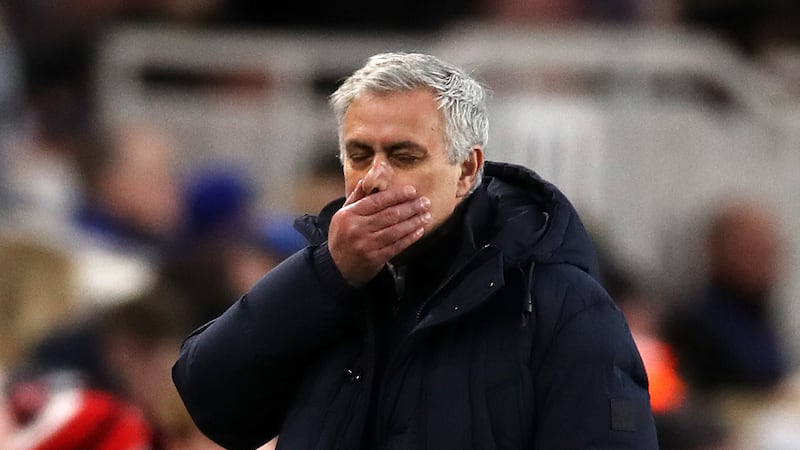IN this age of anodyne interviews, Kevin McStay’s post-match musings last weekend had that rare quality of substance.
McStay’s Roscommon side had just been absolutely demoralised by Tyrone 4-24 to 2-12 in the first round of the Super 8s.
Seven days earlier, Roscommon and Armagh produced the best spectacle of the summer down in Portlaoise.
The football the two sides produced was exhilarating.
Roscommon have climbed mountains under McStay.
But the last part of the mountain before you reach the peak is always the toughest to scale. Only the elite teams get there: Dublin, Tyrone, Kerry...
Roscommon are on the cusp of the elite but, as last Saturday proved, the cusp is still some way short.
After losing to Tyrone, McStay wondered aloud that Roscommon would have to change their style – become more hard-nosed, more defensive oriented – to compete with the likes of the Red Hands.
He questioned whether the Roscommon fans, or players, would want to go down that road and play a type of football that is “hard to watch at times”.
Asked in the post-match press briefing did style matter to him, McStay replied: “Yes, of course it does. But results are more important. Unfortunately that’s the world we live in. I’m not judged on style – I’m judged on results.
“The style of play is a big debate. There were patches of today’s game that was so hard to watch. Three or four minutes the life was being sucked out of the game, passing over and back and going back the way.
“It's a type of football [defensive football] I don’t think Roscommon supporters would go and watch, if we change style dramatically, if we start looking like a Galway or Monaghan or something like that...
“Whether our supporters would want that, whether our players would want that type of game – that’s a discussion we’re going to have to have because we’ve had two years trying to develop ourselves, trying to get out of the lower divisions and into Division One, and try and get a title along the way – thankfully we did.
“But, now, going to the next level, that elite level, is going to take big, strategic decisions in style and in personnel.”
Reporters were left with the very real sense that the next 12 to 24 months could be something of a joyless pursuit in Roscommon.
No more Joga Bonito down in Hyde Park.
Fitness did play a major part in Roscommon’s mauling. Tyrone were streets ahead of them.
Roscommon won plenty of primary possession from kick-outs, but as McStay noted: “Tyrone are the fastest team to reconfigure… Their half-forwards were back like bullets – and they can keep doing it.”
The GAA’s problem is they don’t have a sufficient number of elite teams to make the Super 8s competitive.
The old knock-out All-Ireland quarter-final format in recent years revealed this to be the case so, on one level, you can understand why the GAA tried to do something to enliven the business end of their football season.
The Super 8s could yet get a shot in the arm at provincial venues Clones, Omagh and Hyde Park this weekend.
But moving the furniture around the room to make it look better, more attractive isn’t scratching the surface as to where the GAA should be concentrating its energies.
New President John Horan wants to see a fully-fledged tiered Championship by the end of his three-year tenure (the Super 8s is the start of that process); he's questioning the value of county development squads too and has ordered a major review.
Although it varies from county to county, development squads may be a drain on the finances of the association – both centrally and at county level.
Creating tiers could also signal less money being pumped into county teams who are competing on the lower rungs of the Championship ladder.
Try attracting corporate sponsorship or running Business Lunches for a ‘B’ Championship county team.
We’ve already witnessed the migration of TV crews to the Super 8s this year.
When it comes to covering the ‘B’ and possibly ‘C’ Championships, press reporter numbers will dwindle too – an observation Rory Gallagher made to four reporters after the Division Three final between Fermanagh and Armagh.
Horan’s two-pronged approach is an undoubted money saver for the GAA – but it’s hard to escape the conclusion the strong counties will get stronger and the weak ones will get weaker under tiers.
It’s too easily accepted among the GAA populace that a tiered Championship is a great idea and makes perfect sense on every level.
All the big hitters on the GAA punditry circuit are behind the notion.
Neil Ewing is a Sligo footballer and has articulated better than anyone of the need to resist creating tiers and for the GAA to consider reverting back to the old National Football League format where the lesser counties used to play against the stronger counties in Division 1A/1B and Division 2A/2B.
In other words, teams like Sligo need more exposure to the top teams in order to improve instead of once a year in the Connacht Championship.
“[The old League format] might bring the top teams back to the pack a bit but it would definitely rise the standard of the pack,” Ewing said in a recent interview with The Irish Examiner.
He added: “And in a couple of years you’d have a more competitive Championship, especially in the provinces…
“You need to address why the Championship has become uncompetitive before you start tinkering any more with the Championship. You should be trying to address and close the gap that has opened between the counties, not come up with a system that reflects and perpetuates that gap.”
RTE should put Neil Ewing on The Sunday Game for at least a different perspective - and the GAA should recruit Neil Ewing on one of their committees that is reviewing Championship structures.
Ewing’s voice is akin to trying to halt a capitalist train hurtling along with fewer passengers on it with each passing summer.
The GAA is effectively putting its trust in three or four runaway trains – whose pursuit of sporting excellence can only be admired – but is that the right approach?
Even Division Two teams are struggling to keep up, never mind Three and Four.
“If you look at the GAA’s website,” said Ewing, “it states the Association was formed because at the time ‘largely only the gentry and aristocracy were allowed to meaningfully participate in sport’.
“Well, you could tie that back to what is happening now - these days it’s largely only the gentry and aristocracy of Gaelic football that are allowed to meaningfully participate in the sport.”
Perhaps the GAA is looking in the wrong places for solutions…







